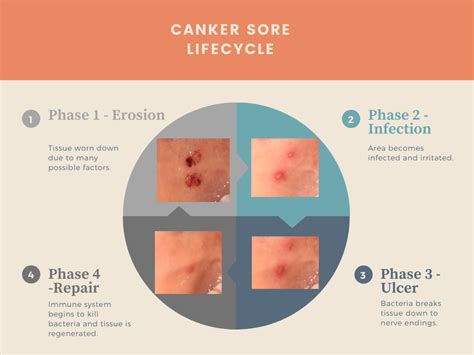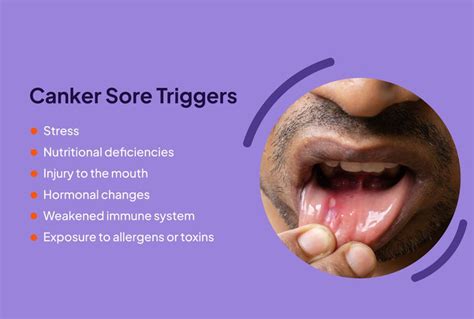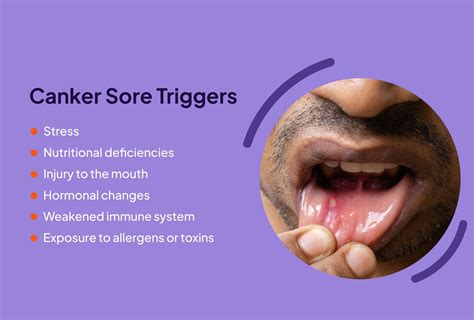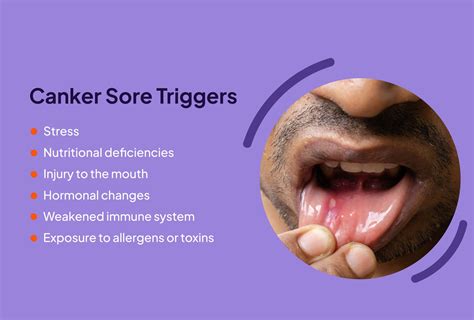Intro
Canker sores, also known as aphthous ulcers, are small, shallow lesions that develop on the soft tissues in the mouth, such as the tongue, inner cheeks, and lips. They are a common and often recurring problem that can cause discomfort, pain, and difficulty eating and speaking. Despite their prevalence, the exact causes of canker sores are not fully understood, but research has identified several factors that contribute to their formation.
Canker sores are thought to be the result of a combination of factors, including tissue injury, stress, and immune system dysfunction. When the mucous membranes in the mouth are damaged, either due to accidental biting, dental work, or other forms of trauma, the body's natural response is to initiate an inflammatory response to promote healing. In some cases, this inflammatory response can become excessive, leading to the formation of a canker sore. Additionally, stress, hormonal changes, and certain nutritional deficiencies, such as a lack of vitamin B12 or iron, can also contribute to the development of canker sores.
The process of canker sore formation involves a complex interplay between the immune system, the nervous system, and the oral mucosa. When the oral mucosa is damaged, it releases chemical signals that attract immune cells, such as white blood cells, to the affected area. These immune cells release pro-inflammatory chemicals, such as cytokines and chemokines, which promote inflammation and tissue damage. As the inflammation progresses, the oral mucosa becomes ulcerated, and a canker sore forms. The pain and discomfort associated with canker sores are due to the exposure of nerve endings in the affected area, which can be irritated by food, drink, and other stimuli.
Understanding Canker Sore Formation

To better understand canker sore formation, it is essential to examine the various factors that contribute to their development. These factors can be broadly categorized into three groups: genetic, environmental, and hormonal. Genetic factors, such as a family history of canker sores, can increase an individual's susceptibility to developing the condition. Environmental factors, such as stress, poor oral hygiene, and food sensitivities, can also contribute to canker sore formation. Hormonal changes, such as those experienced during menstruation or menopause, can also play a role in the development of canker sores.
Genetic Factors
Genetic factors can play a significant role in the development of canker sores. Research has shown that individuals with a family history of canker sores are more likely to experience the condition themselves. This suggests that there may be a genetic component to canker sore formation, with certain genetic variants influencing an individual's susceptibility to the condition. Additionally, genetic factors can also affect the severity and frequency of canker sores, with some individuals experiencing more severe or frequent episodes than others.Canker Sore Triggers

Canker sore triggers can be broadly categorized into two groups: internal and external. Internal triggers, such as hormonal changes, stress, and nutritional deficiencies, can contribute to canker sore formation. External triggers, such as tissue injury, food sensitivities, and environmental factors, can also play a role in the development of canker sores. Identifying and avoiding these triggers can help reduce the frequency and severity of canker sores.
Some common canker sore triggers include:
- Citrus fruits and juices
- Spicy or acidic foods
- Chocolate
- Nuts and seeds
- Food additives and preservatives
- Stress and anxiety
- Hormonal changes
- Nutritional deficiencies
- Tissue injury
External Triggers
External triggers, such as tissue injury and food sensitivities, can also contribute to canker sore formation. Tissue injury, either due to accidental biting, dental work, or other forms of trauma, can cause inflammation and damage to the oral mucosa, leading to the formation of a canker sore. Food sensitivities, such as those to citrus fruits or spicy foods, can also irritate the oral mucosa and trigger canker sore formation.Canker Sore Symptoms

Canker sore symptoms can vary in severity and duration, but typically include:
- A small, shallow lesion on the oral mucosa
- Pain or discomfort, especially when eating or drinking
- Redness and inflammation around the affected area
- Swelling or bleeding in severe cases
- Difficulty eating or speaking due to pain or discomfort
Canker Sore Diagnosis
Canker sore diagnosis is typically based on a visual examination of the affected area and a review of the individual's medical history. A healthcare professional may perform a physical examination to rule out other conditions, such as oral cancer or infectious diseases. In some cases, a biopsy may be necessary to confirm the diagnosis.Canker Sore Treatment

Canker sore treatment typically involves a combination of self-care measures and medical interventions. Self-care measures, such as avoiding triggers, practicing good oral hygiene, and using topical anesthetics or pain relievers, can help manage symptoms and promote healing. Medical interventions, such as prescription medications or dental treatments, may be necessary in severe or persistent cases.
Some common canker sore treatments include:
- Topical anesthetics, such as lidocaine or benzocaine
- Pain relievers, such as acetaminophen or ibuprofen
- Antihistamines or corticosteroids to reduce inflammation
- Antibiotics or antifungals to treat underlying infections
- Dental treatments, such as fillings or crowns, to repair damaged teeth
Canker Sore Prevention
Canker sore prevention involves avoiding triggers, practicing good oral hygiene, and maintaining a healthy diet. Avoiding triggers, such as citrus fruits or spicy foods, can help reduce the frequency and severity of canker sores. Practicing good oral hygiene, including regular brushing and flossing, can help prevent tissue injury and promote healing. Maintaining a healthy diet, including foods rich in vitamins and minerals, can help support immune function and reduce the risk of canker sores.Canker Sore Complications

Canker sore complications can include:
- Infection or abscess formation
- Scarring or tissue damage
- Difficulty eating or speaking due to pain or discomfort
- Nutritional deficiencies due to avoidance of certain foods
- Emotional distress or anxiety due to recurring episodes
Canker Sore Prognosis
Canker sore prognosis is generally good, with most episodes resolving on their own within 1-2 weeks. However, recurring or severe episodes can have a significant impact on quality of life, and may require ongoing medical treatment or lifestyle modifications.What causes canker sores?
+Canker sores are thought to be caused by a combination of factors, including tissue injury, stress, and immune system dysfunction.
How can I prevent canker sores?
+Preventing canker sores involves avoiding triggers, practicing good oral hygiene, and maintaining a healthy diet.
What are the symptoms of canker sores?
+Canker sore symptoms can include a small, shallow lesion on the oral mucosa, pain or discomfort, redness and inflammation, and difficulty eating or speaking.
How are canker sores treated?
+Canker sore treatment typically involves a combination of self-care measures and medical interventions, such as topical anesthetics, pain relievers, and antibiotics.
Can canker sores be a sign of an underlying condition?
+In some cases, canker sores can be a sign of an underlying condition, such as a nutritional deficiency or immune system disorder. If you experience recurring or severe canker sores, it is essential to consult with a healthcare professional to rule out any underlying conditions.
If you have experienced canker sores, you know how painful and frustrating they can be. By understanding the causes, symptoms, and treatment options for canker sores, you can take steps to prevent and manage these uncomfortable lesions. Whether you are looking for ways to avoid triggers, practicing good oral hygiene, or seeking medical treatment, there are many resources available to help you cope with canker sores. We invite you to share your experiences and tips for managing canker sores in the comments below. By working together, we can help each other find relief from these pesky sores and maintain optimal oral health.
